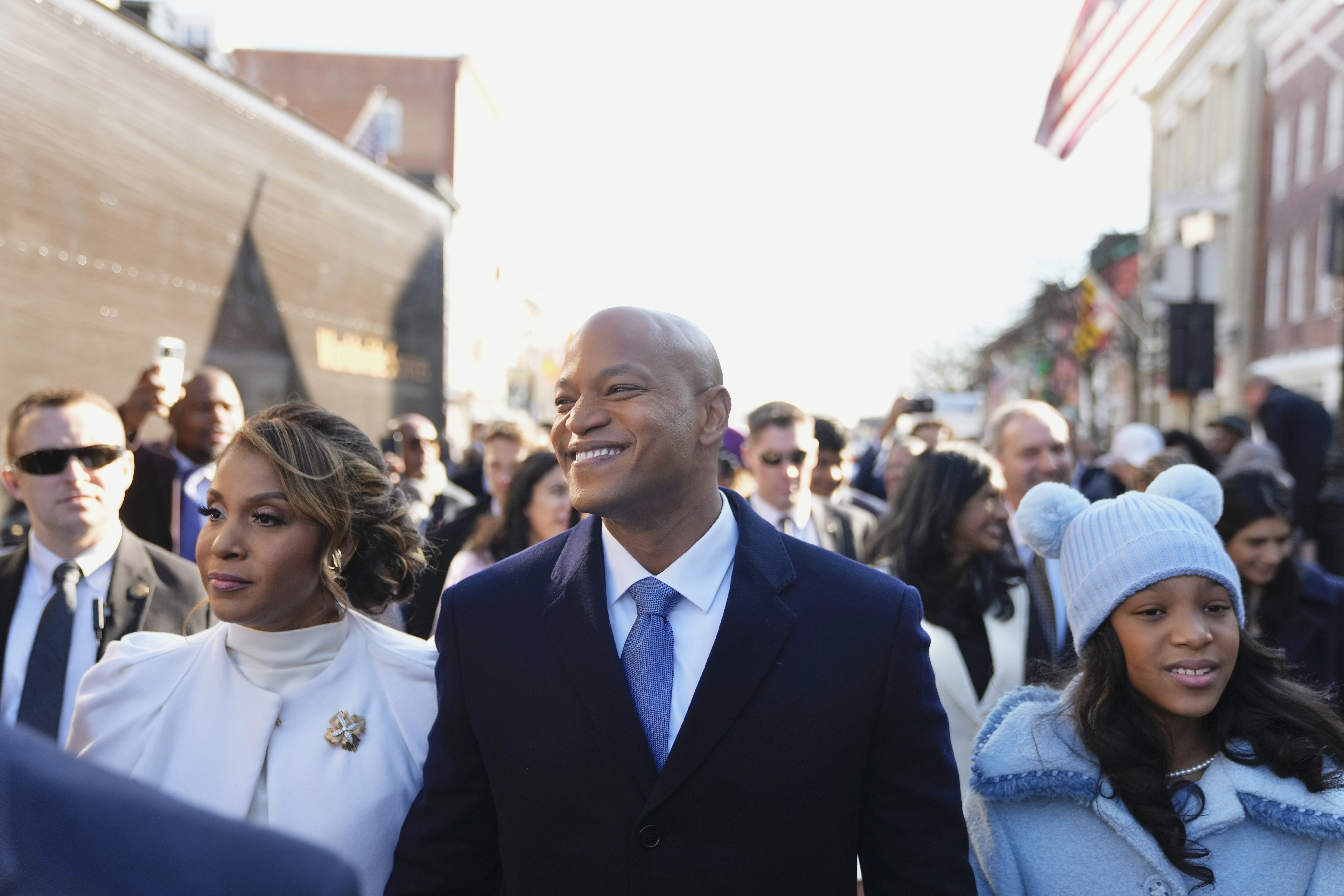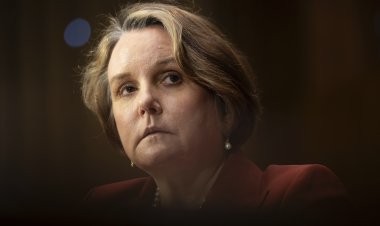No Democratic Bench? Josh Shapiro and Wes Moore Are Ready To Step Up
The inaugurations in Pennsylvania and Maryland this month introduced Democrats to their future.


HARRISBURG, Penn. – Gov. Josh Shapiro made headlines for taking the oath of office last week on a stack of scripture that included a Hebrew bible from Pittsburgh’s Tree of Life Synagogue, site of the deadliest antisemitic attack in American history.
Yet while Shapiro invoked his Jewish faith in his inaugural address, more memorable on a brisk-but-not-bitter day outside Pennsylvania’s grand capitol was what happened when the St. Thomas Gospel Choir from Philadelphia performed “Lift Every Voice and Sing”: Shapiro sang along with them, mouthing the lyrics to the Black National Anthem from heart while unabashedly rocking back and forth on both legs.
The next day, outside Maryland’s history-drenched State House in Annapolis, it was Oprah Winfrey who left many attendees (and perhaps even a few local pols) starstruck. Winfrey introduced Gov. Wes Moore, the state’s first Black governor and only the third-ever elected African-American governor.
However, the more revealing presence on stage may have been that of somebody few recognized, Lt. Col. Jamie Martinez (Ret.). Martinez took the microphone to remind an audience that included Eric Holder, Chris Tucker and Cal Ripken that the 44-year-old Moore isn’t just a political phenom: he was also a fellow soldier from the 82nd Airborne who led troops in Afghanistan.
Both new governors reached deep into their states’ past to evoke America’s promise and trumpet their own. Shapiro recalled William Penn’s credo of religious tolerance and Moore reminded his audience that while they stood just up the hill from docks where slaves were brought the inauguration was no “indictment of the past” but rather “a celebration of our collective future.”
If it all felt like a highly-choreographed preview of future ambitions, campaigns and perhaps swearing-ins, well, I wasn’t the only one with the same premonition.
“This won’t be the only inauguration with him we go to,” Holder told me as we waited for the festivities to get under way in Annapolis, saying of Moore that “he’s got that thing.”
As Democrats bemoan their political bench there’s a frequent glass-is-half-empty refrain about the most-often mentioned prospects waiting behind the 80-year-old in the White House: Kamala Harris can’t win a general election, Pete Buttigieg can’t win a primary and there’s no way Michelle Obama will run, will she?
I find it mystifying. And especially after the midterms.
Senators Mark Kelly (D-Ariz.) and Raphael Warnock (D-Ga.), an actual astronaut and the actual pastor of Martin Luther King’s Ebenezer Baptist Church, paired their sterling bios with a demonstration of their electoral chops, winning in a pair of formerly red states that just now happen to pivotal presidential battlegrounds. In another show of strength, Gov. Gretchen Whitmer won re-election in Michigan, ever the Electoral College prize, by over 10 points.
And then there are the new three Democratic governors from the northeast, Shapiro, Moore and Maura Healey of Massachusetts, who all thrashed MAGA’fied Republicans, were all born after 1970 and all have law enforcement or military credentials.
Which of them would be willing to run, or viable if they did, should President Biden change course and not seek reelection is another story. But there’s no lack of traffic at the foot of that bridge the president promised he’d be to the next generation of Democrats.
Just beginning their governorships now, it may be too soon for Shapiro and Moore to run next year, and allies of both suggested to me they would be unlikely to run for president so soon.
Yet as I made my way around Harrisburg and Annapolis last week, I was struck by the air of expectations, or really the operating assumption, that both new governors would run for president.
“That was quite a speech,” Rep. Mary Gay Scanlon (D-Pa.) told me after Shapiro’s inauguration, failing to suppress her knowing smile as she said her longtime friend from the Philadelphia suburbs “has a good vision for the whole country.”
It all feels a bit familiar.
An aging Democratic leadership in Washington, a cadre of up-and-coming governors and the question is only when and who among this next generation seeks the presidency: in the 1980s, it was a group of Southerners, not northeasterners, that included Chuck Robb of Virginia, Jim Hunt of North Carolina, Richard Riley of South Carolina and then Louisiana’s Buddy Roemer, Mississippi’s Ray Mabus and, first in his class, Arkansas’s Bill Clinton.
Just as many of these governors benefited from the Reagan defense build-up, with federal dollars flowing to their states, the new crop of Democratic chief executives find themselves taking office with every governor’s favorite two words: budget surplus.
Between the spending on Covid relief, the infrastructure bill, the Inflation Reduction Act and the CHIPS legislation, to say nothing of the $1.7 trillion government funding bill Congress passed in December, states are seeing a flood of money come from Washington.
Thanks in part to the aid, Moore and Shapiro will craft their first budgets with the chance to play Santa rather than the Grinch. Notably, though, what animates each of them is less any sort of spending wish list than a pair of non-ideological initiatives that just happen to be broadly appealing to general election voters.
For Shapiro, it was an executive order making it easier for Pennsylvanians without college degrees to work for the state and for Moore it’s his vow to offer young Marylanders a service year option after high school. Both know what sort of message these proposals send about their party, and themselves, at a moment Democrats are fending off charges of elitism.
The two are eager to reclaim patriotism, faith and family, which were all on display at their inaugurations, mostly vividly through the presence and participation of their children.
Shapiro, especially, can’t understand how Democrats get tripped up on these topics.
When I spoke to him at the Democratic Governors Association meeting shortly after his 15-point win, he said there should be a focus on what binds all Americans — “we cherish our democracy, we love our freedom and we embrace this country.”
Before I could even get to the education wars, he continued.
“And we should be teaching our kids about that,” said Shapiro. “We should be teaching them about the good and the bad. And we should be teaching them in a way that doesn’t pit one of them against each other but rather teaches them to love this nation, love one another even more.”
If you thought that was an echo of Barack Obama, or Bill Clinton, deftly decrying the false choices of our political culture, well, Moore had more of the same in his inaugural address.
“I know what it feels like to have handcuffs on my wrists,” he said, recalling a police encounter when he was only 11. “I also know what it’s like to stand with families and mourn the victims of violent crime. We do not have to choose between being a safe state and a just one. Maryland can and will be both.”
Such language, of course, prompts questions about the politics of the two men, how they’ll govern and position themselves for the future.
That will in part be shaped by the differences in their states. If a handful of special elections turn out as expected next month, Shapiro will find a one-seat Democratic House majority and a six-seat GOP Senate majority. Moore, on the other hand, enjoys Democratic supermajorities in both chambers of Maryland’s legislature.
Shapiro will have to negotiate to find consensus with Republicans while Moore must navigate his party’s factional disputes, between center-left and progressives.
Shapiro’s task will be easy enough when it comes to bolstering spending on vocational and technical education or hiring more police officers. Where he’ll be tested — and offer an insight into his long-term thinking — is on the question of whether Pennsylvania will remain in the northeast’s greenhouse gas compact, which caps CO2 emissions.
Shapiro dodged the question during the campaign, not wanting to alienate his party’s environmentalists or workers in the state’s energy industry.
“How he chooses to move forward or not I think will set a very, very significant tone for the outset of his administration,” the state’s Republican Senate Majority Leader Joe Pittman told me about Shapiro’s decision.
Dispensing with any subtlety, Pittman said of the governor, “It’s no secret that his dream is to be President of the United States” and energy policy presents a crossroads for Shapiro: “govern in a purple state or whether he moves more toward the progressive base of his party.”
What was striking about my conversations with Pittman and Republican state Sen. Kim Ward, the Senate President Pro Tempore – besides their matter of fact assumptions about Shapiro’s ambitions – was how optimistic they were about being able to work together with a Democratic governor.
That’s partly because they see a fellow political animal – Shapiro was a congressional staffer before rising in elected office – and somebody who knows from deal-making.
It’s also because he’s reached out to them privately and put together a bipartisan cabinet, including Al Schmidt, the former Philadelphia elections official who became famous for defending his city’s ballot integrity after the 2020 presidential race.
“He doesn’t sound like he is going to govern from the far left,” Ward told me shortly after Shapiro’s inaugural speech.
When I asked the then-governor-elect at the DGA event what he sees as his legacy, he all but said as much, pointing to the GOP votes he won in the election.
“If I can show those Republicans that it wasn’t just a vote in an election but actually what they created was a new dynamic for governing, where I can actually get big things done with Republicans and Democrats together, that would be probably be the most important thing I can accomplish,” said Shapiro.
It may not sound like a recipe for winning a Democratic primary, but, then, 2020 demonstrated the party’s voters can be more practical-minded than ideologically driven.
While Shapiro is a known commodity to the Harrisburg crowd, Moore is a blank slate to much of Annapolis.
Last year’s election was his first bid for office and he has spent much of his professional life in New York City, as an investment banker at Citigroup and then as head of Robin Hood, the anti-poverty organization.
These connections were made clear by the presence at the inauguration of two well-known New Yorkers, former Mayor Bill de Blasio (who was in the audience) and Chelsea Clinton (who was in the second row on stage).
Yet just as in Pennsylvania, the Maryland Republicans in attendance made no attempt at arguing Moore was a left-winger pretending to be a centrist.
“I think he really, really is more of a moderate,” William Folden, a GOP state senator from Frederick County told me after Moore’s speech, pointing to the “grounding” impact of the governor’s military service.
While Shapiro is faced with a decision on the climate compact, Moore will quickly be confronted with whether, or how much, to constrain a Democratic legislature eager to pursue an expansive agenda after eight years of being held back by a Republican governor, Larry Hogan.
Though I’m not sure it’s wrangling with the mandarins of the Maryland General Assembly that Winfrey had in mind when she excitedly said “there’s so much more to come” for Moore because “he’s just getting started.”
It makes Tom McMillen wince.
McMillen is the former University of Maryland basketball great who, like Moore, went on to become a Rhodes Scholar. He later served in Congress from Maryland.
He’s fond of Moore, but as McMillen walked toward the inauguration last week he suggested the new governor should be more focused on the crabs of the Chesapeake more than the Clyburns of Carolina.
“He’s got to be a good governor,” said the old power forward, looking down from his 6’11” frame to offer a stern lesson from the past. “That’s how Clinton got defeated after his first term in Arkansas, Wes has got to stay very focused.”












